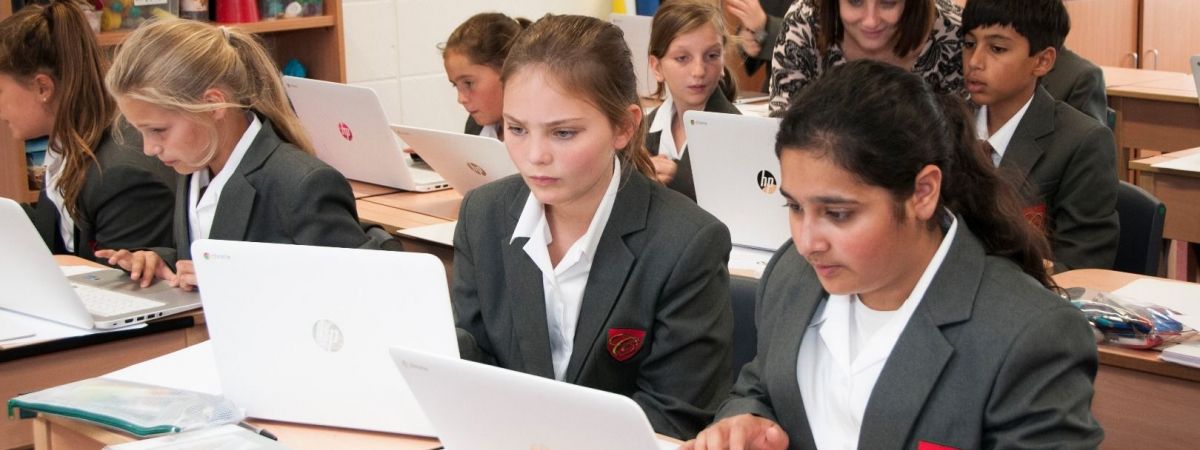A ban on smartphones in schools? En Marche!
Alex Wynter, a parent and supporter of PTE, has written this blog for us:
Earlier this month an article on US ‘tech-free’ schools appeared in The Times by the paper’s Los Angeles correspondent that began with a bullseye of a tease lead. ‘The Waldorf School of the Peninsula is small, exclusive and packed with the children of Silicon Valley executives who love the role that technology plays in the pupils’ education there,’ wrote Ben Hoyle. ‘That is, it plays no role whatsoever.’
Instead, he continued, children at the $25,000-a-year elementary school in Los Altos, California, ‘explore the world through physical experiences and tasks designed to nurture their imagination, problem-solving ability and collaborative skills.’
The Times story is not the first time this issue – about web moguls keeping their own children off the internet as long as possible – has emerged, but it’s surely one of the most damning manifestations of it.
Hoyle reported billionaire Facebook investor Sean Parker saying that the social media platform had been designed to be as addictive as possible. ‘God only knows what it’s doing to our children’s brains,’ he said.
Yes, read that again: God only knows what it’s doing to our children’s brains.
Intrigued by this extraordinary confession, I thought I’d look up more of what Parker had actually said (to the Axios news site), and indeed it got worse. The digital opiate in question here is characterized by him as a ‘social-validation feedback loop’ – a concept that will be instantly recognized by any parent who’s noticed the strong social element in teenage smartphone addiction.
Parker, a former hacker, explained: ‘The thought process that went into building these applications, Facebook being the first of them, was all about: How do we consume as much of your time and conscious attention as possible? And that means that we need to sort of give you a little dopamine hit every once in a while, because someone liked or commented on a photo or a post or whatever.’
The creators of social media platforms were, he added (and read this twice as well), ‘exploiting a vulnerability in human psychology. The inventors, creators – it’s me, it’s Mark [Zuckerberg], it’s Kevin Systrom on Instagram – all of these people understood this consciously [Parker emphasizes these words on the tape] and we did it anyway.’
A clip from the interview is online; judge for yourself whether he’s being contrite or slightly triumphalist (I’d say a bit of both).
Hoyle’s piece did not cause much of a stir that I noticed, but in a leader (cleverly headlined ‘Phone Home’), The Thunderer presented a compelling threefold case against tech and Google in schools. Without it, children ‘focus, interact, think critically and solve problems’, their natural memories kick in and they remember more and write more, and they’re liberated from ‘the incessant demands of social media’.
What is the intelligent response to all this in a free society? Should we follow the example of France? The French education minister, Jean-Michel Blanquer, recently confirmed that as of next academic year, the government was going to do exactly what Emmanuel Macron’s election manifesto said it would: ‘Nous interdirons l’usage des téléphones portables dans l’enceinte des écoles primaires et des collèges.’
The Times piece pointed the finger at schools: ‘The [tech-free] approach contrasts starkly with the new classroom orthodoxy in most American schools where children are spending more and more time staring at screens in lessons.’
Parents who have tried to enforce a more limiting regime on phones and online devices than their children’s schools – in favour of things like books, sport, and face-to-face human interaction – can testify to how difficult it is to arrange things this way round.
It’s isn’t even theoretically possible for parents to ration or limit online time when schools not only do not, but actually direct children to Google problems on their phones in class (or ‘use Internet resources’ in the typical teacherly instruction). The other way round is at least possible in theory, though a national discussion on whether we agree with French voters that it’s also desirable has yet to begin.
The tragedy of Toby Young’s downfall – for those parents who might side with En Marche! here – is that he is probably the best-known educationist who generally ‘gets’ this issue. Young’s 2014 paper Prisoners of the Blob included a section called ‘Just Google It’ that suddenly seems ahead of its time, if the attitude of the tech-plutocrat parents is anything to go by.
Before the perception took hold of a social media-related crisis in teenage mental-health, for example, it may have seemed fashionably edgy for people like Justin Webb (quoted by Young) to say: ‘Knowing things is hopelessly twentieth century.’ All of which raises the slightly depressing thought that even the issue of tech in schools has been politicized.
There is a legitimate baby-bathwater argument here; and some genuinely valuable and interactive teaching programmes available, like IXL Maths – a true marvel and the Internet at its very best.
But now comes evidence, cited in Monday 26th February’s PTE round-up, that tech is causing bodies to atrophy as well as minds, with a report from paediatricians that young children struggle to hold pens and pencils to write with because excessive use of touch screens has hindered development of their finger muscles!
And yes, you may well need to read that twice too.
The views expressed here do not necessarily reflect those of PTE or its employees.
